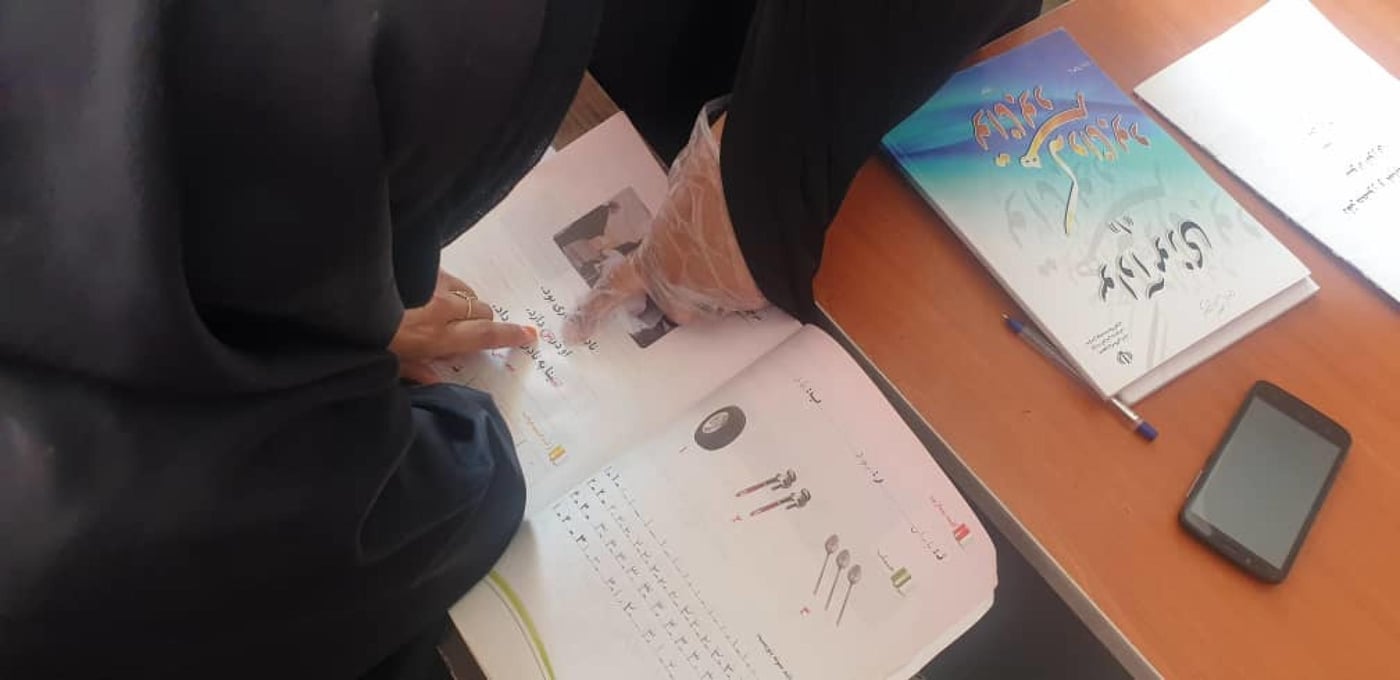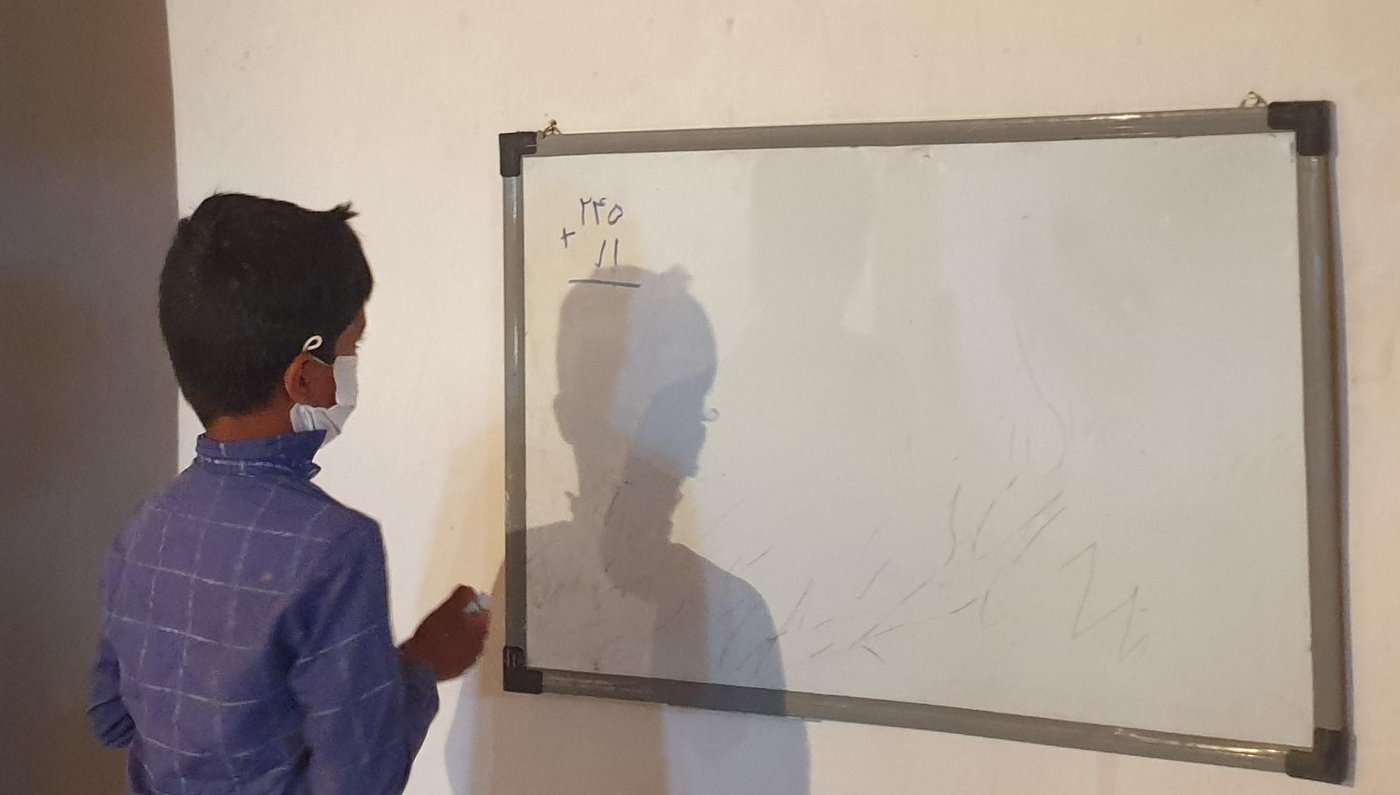Through literacy and numeracy classes, facilitated by the Norwegian Refugee Council (NRC) and held in collaboration with the Literacy Movement Organization (LMO) of Iran, teachers like Ms Rahmati are teaching Afghan students to read and write.
Some of the students have never been to school before. But with the right help, they can catch up with their years of missing education in an accelerated way and eventually go to an Iranian public school at an appropriate level for their age.
The Norwegian Refugee Council (NRC) works to support refugees and displaced people in over 30 countries around the world, including Iran. Support our work today
Sima kept coming to my classes despite all the challenges her family was facing and studied really hard to pass my courses
Former student Sima* was able to complete the LMO programme and move into formal learning, with the support and enthusiasm of Ms Rahmati.
“Sima gradually became interested in learning to read and write and motivated to learn more,” Ms Rahmati explains. “She kept coming to my classes despite all the challenges her family was facing and studied really hard to pass my courses.”
A challenging year
Ms Rahmati has been teaching Afghan students like Sima for about four years. She is used to teaching in a classroom with students in front of her, raising their hands when they have a question.
But 2020 proved to be a different year. Covid-19 brought challenges to teachers like Ms Rahmati, her students, and the parents who are supporting their children’s learning at home.
Iran was one of the first countries to be hit by the pandemic after China, and had recently faced a third wave. As a result, schools have been closed for periods of time.
Teachers tried to adapt as quickly as they could to online learning methods, including using smartphone apps. But for non-formal education, like NRC’s literacy and numeracy courses, additional challenges had to be overcome.
Some of the students were illiterate and didn’t own or know how to use a smartphone. Others were struggling to pay the internet fees required to follow distance learning. Some were really missing the personal contact with a teacher that you can only get through face-to-face classes. And some Afghan students had to work to support their families or help with household chores, meaning they didn’t have time for study.

Keeping connected during lockdown
Ms Rahmati has remained committed to teaching throughout the Covid-19 outbreak, just as her students were committed to learning.
Keeping in touch with students became a challenge for many teachers. But Ms Rahmati tackled it head-on. She was determined not to let her students forget the newly learned topics or miss out on the opportunity to learn more.
“I started to teach the lessons using a smartphone”, she says.
However, it was not easy for all the students to adapt to the new way of studying. Some students felt more comfortable in a classroom setting, and found studying via a smartphone difficult. Ms Rahmati tried hard to keep contact with her students by explaining the lessons and taking exams online.
“I tried to solve this problem by meeting with some of the students individually or as a group in a park and helping them keep up with the class,” she explains.
When Afghans see that there is an opportunity to learn to read and write, they welcome it very much
When the academic year started in September, schools re-opened, although only for a short time. As the Covid-19 situation worsened, they closed again in October. Discussions are ongoing to decide when to reopen them.
Despite this, access to education continues to be Ms Rahmati’s priority: “As a teacher, I could not let my students become discouraged and lose their motivation for studying,” she says.
Sharing opportunities
Ms Rahmati believes that Afghan students are very enthusiastic about learning to read and write because becoming literate will help them solve any problems they may face in future.
“When Afghans see that there is an opportunity to learn to read and write, they welcome it very much,” she says. “Whenever I call Setareh* to give her homework, she does it immediately. She does not like to postpone it.”
“And when I went to Setareh’s house to give her the books for the new level, you have no idea how happily she came down the stairs to receive them!”

In turn, teaching Afghan students has brought a great deal of job satisfaction for Ms Rahmati. “When Afghan students see that they can read and write, they become enthusiastic and this makes me motivated,” she explains. “When I see their enthusiasm, why should not I try harder?”
Despite all the recent challenges, Ms Rahmati is preparing her students for their final exams. Many, like Setareh, will then be able to move on and finally join an Iranian public school.
Access to school for all Afghan children
In 2015, Iran’s government issued a decree stating that Afghan children, regardless of their legal status, could enrol in Iranian public schools.
According to the Government of Iran, in the 2019-20 academic year, 480,000 displaced children from Afghanistan were enrolled in public schools, including 140,000 who are considered “undocumented”.
Prior to the decree, only documented families – those with de facto refugee status or passports and Iranian visas – could register in public schools.
With the generous support of the European Union Humanitarian Aid, nearly 4,000 Afghans, including Ms Rahmati’s students, have participated in these literacy and numeracy classes to date. The classes were part of an 18-month project called “Education and Protection for Vulnerable Afghan Families in Iran”, which was held in six provinces of Iran to improve Afghans’ access to education.
Our work in Iran
There are between 3 and 3.5 million displaced Afghans living in Iran. Some have been in the country for four decades.
In 2020, NRC supported over 90,000 individuals in the country, including displaced Afghans and Iranians affected by natural disasters. Since early 2020, we have significantly expanded our programme to support the Covid-19 pandemic response in Iran.

During the Covid-19 pandemic, our efforts have been focused on providing water, sanitation and hygiene (WASH) interventions. This includes renovating or establishing appropriate facilities in schools – for example, critically needed handwashing stations. In addition, we have provided cleaning kits to schools and urban health centres, and hygiene kits to Afghan families.
We have also scaled up our cash assistance to vulnerable Afghans to help them meet their most basic needs.
*Names have been changed to respect the individuals’ wish for anonymity.
This article covers humanitarian aid activities implemented with the financial assistance of the European Union. The views expressed herein should not be taken, in any way, to reflect the official opinion of the European Union, and the European Commission is not responsible for any use that may be made of the information it contains.


